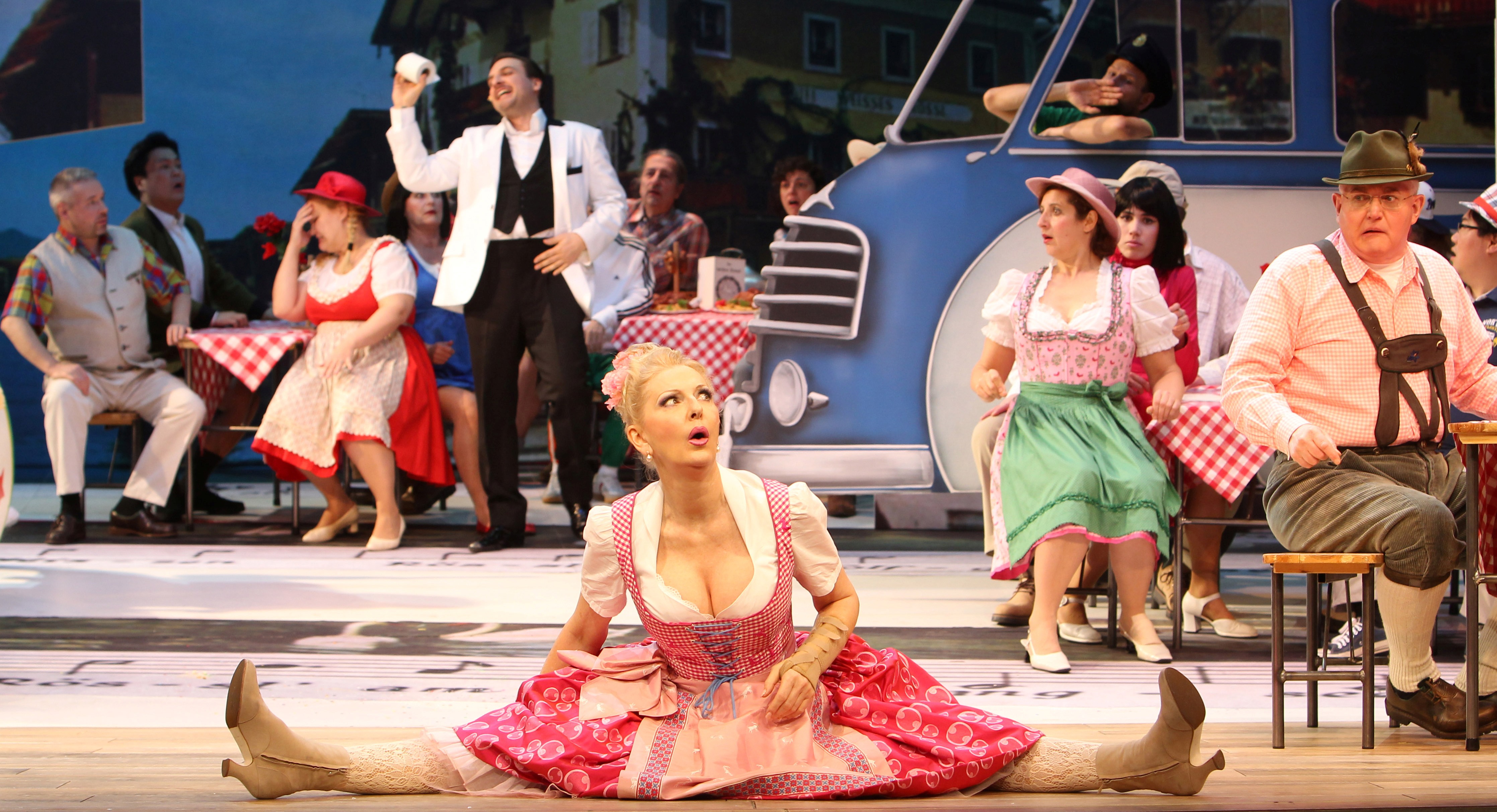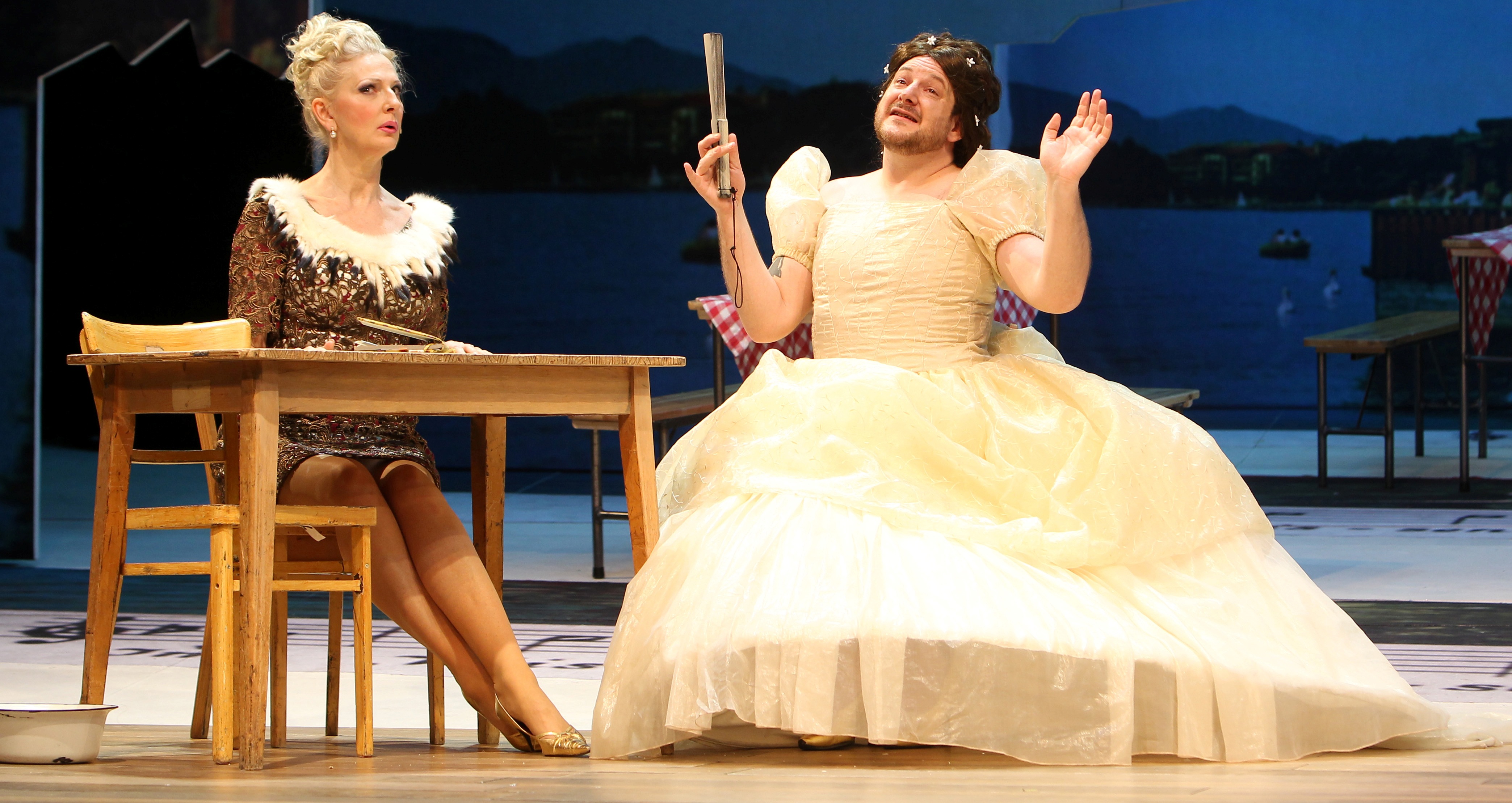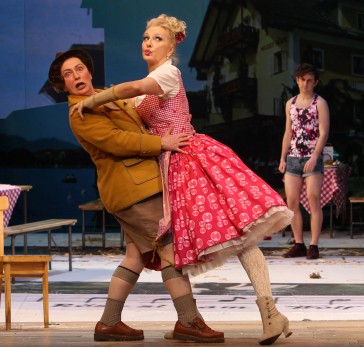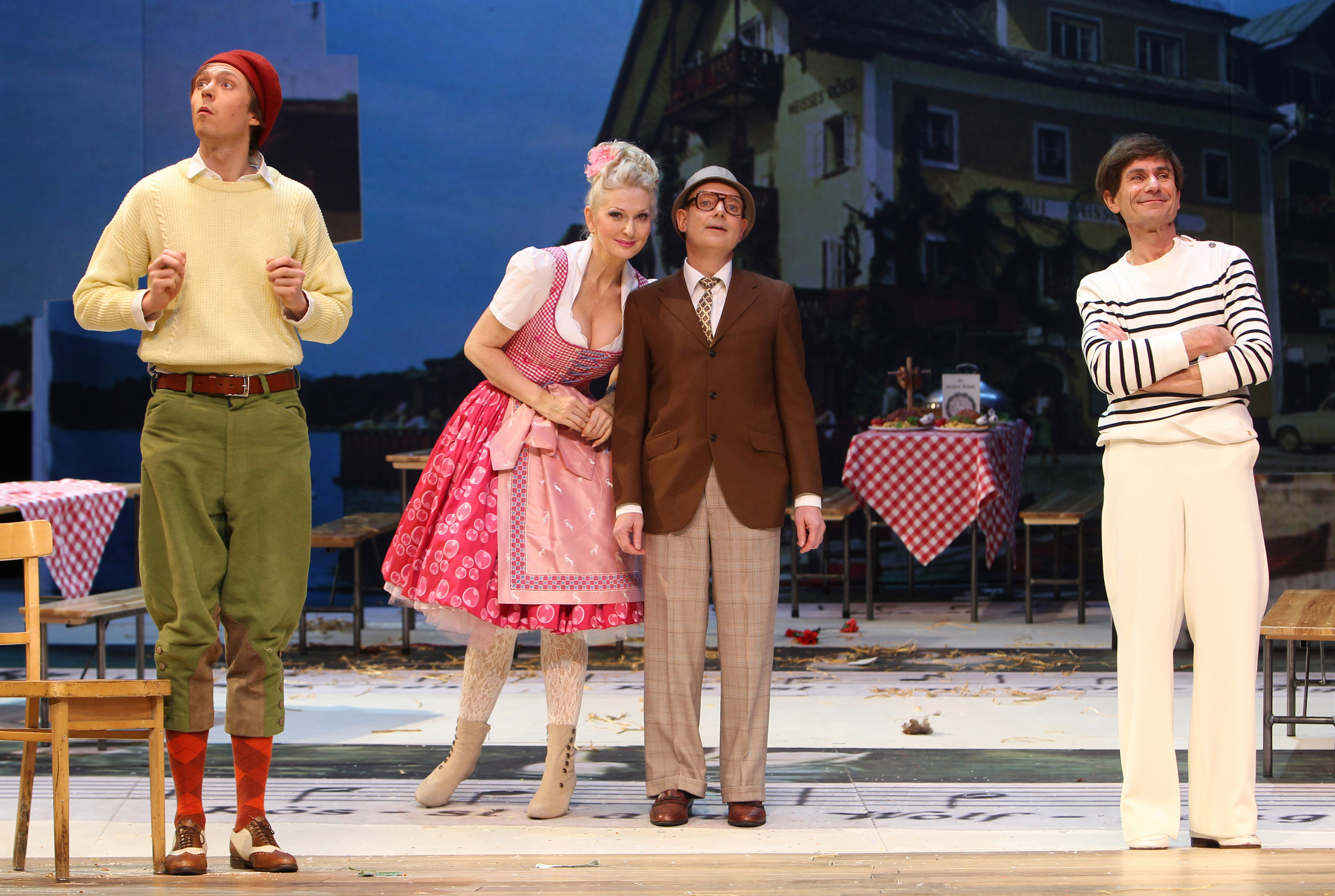Kevin Clarke
Operetta Research Center
1 March, 2015
When a production of White Horse Inn starts with a new overture and “Somewhere Over the Rainbow” – segueing into a Best-of-medley of gay classics from Gloria Gaynor to the Village People and Marianne Rosenberg – you know you are in for something “different.” In the case of the new Bremen production by Sebastian Kreyer, it is a conscious re-reading of the show for the “Generation LGBTQIA,” as the New York Times recently described the millennial generation, coming to operetta today.

The only two straight people left: Désiree Nick as Josepha Voglhuber and Johannes Kühn as Leopold in the Bremen production of “Im weißen Rössl.” (Photo: Jörg Landsberg/Theater Bremen)
“There’s a very different generation of people coming of age, with completely different conceptions of gender and sexuality,” writes Jack Halberstam (formerly Judith), a transgender professor at the University of Southern California and the author, most recently, of Gaga Feminism: Sex, Gender, and the End of Normal. It is a generation that does not define itself via who they have sex with, but who they are. Or, as the New York Times noted: “If the gay-rights movement today seems to revolve around same-sex marriage, this generation is seeking something more radical: an upending of gender roles beyond the binary of male/female. The core question isn’t whom they love, but who they are — that is, identity as distinct from sexual orientation.”
How do you treat operetta and, in this case, Im weißen Rössl, in times like these? Stage director Sebastian Kreyer wanted to experiment with this challenge. He presented his interpretation at the Goetheplatz Theater in Bremen this week, to mixed reactions. After all, your classic first night audience in Northern Germany is not only composed of LGBTQIA people, but also …. well, the rest of the theater going world. Who reacted surprisingly relaxed, though, to a gender redefining reading of this popular show.

The cabaret star and TV personality Désirée Nick as Josepha in Bremen. (Photo: Jörg Landsberg/Theater Bremen)
In Kreyer’s production, in which only actors play the main roles and there is not an opera singer in sight, the two secondary couples of the operetta – Dr. Otto Siedler/Ottilie and Sigismud Sülzheimer/Klärchen – are turned into an all-male ensemble and thus gay couples, acting noticeably “effeminate” and fulfilling every possible gay cliché there is in terms of movements and wrist positioning: Otto (Matthieu Svetchine) and Otti (Peter Fasching), Sigismund (Siegfried W. Maschek) and Karlchen (Justus Ritter). Add to this a grumpy Giesecke who is played by a woman, dressed as a trans* man (Gabriele Möller-Lukasz). The Piccolo (Lisa Guth) is, in turn, played by a young woman dressed as a man, horny and in love with Leopold, whose pants he/she regularly grabs and whom he/she humps like a dog.
This leaves Leopold (Johannes Kühn) and Josepha (Désirée Nick), the only straight people left in this operetta universe.
He is pining for her, but she wants something else, something more – Dr. Siedler. The man she cannot have, because he only has eyes for Otti.

No need for an Emperor anymore: in Bremen, the royal guest in act 2 was a cross-dressed Sissi. ((Photo: Jörg Landsberg/Theater Bremen)
At the height of the emotional turmoil, the emperor is supposed to arrive. But in sync with the gender logic of this production Kaiser Franz Joseph is turned into his own wife: Sissi (Matthieu Svetchine.) Making quite an entrance, looking like a heavier version of Conchita Wurst.
You will rightly ask: how does all of this work on stage? The answer is: when the staging follows the original dialogue and action, it works surprisingly well, because the original White Horse Inn – written by a team of gay men (Hans Müller and Erik Charell) – is already filled with gender-bending moments, and obviously the love stories can be played in any gender constellation today. Considering that Rössl is set in pre-WW1 times, when homosexuality was still a punishable crime, a “gay” version of the story could have offered a chance to show how the love that dare not speak its name triumphs in the end, heralding a new millennium in which Stonewall and the Gay Rights Movement shimmer in the not too distant future.

Wilhelm Giesecke as a trans*man: Gabriele Möller-Lukasz together with Désirée Nick and the irresiatble Peter Fasching as Otti-in-tight-shorts. (Photo: Jörg Landsberg/Theater Bremen)
But that is not the approach Kreyer opted for. Instead, his reading is a deconstruction of the piece, meaning that he breaks down the dialogue and action, inserts new texts and scenes, that expand on ideas and thoughts, and make the whole thing an anti-realistic affair to begin with. It’s an approach not new to operetta (nor opera and theater) and highly popular with many younger stage directors in Germany. Whether you applaud this or not will remain a personal choice. What can be said, here, is that this reading with all the extras offers so many interpretive moments as I have rarely seen in any White Horse Inn staging. In terms of “thought provocation” this certainly is one of the most memorable versions around.
The score is part of the deconstruction, not just the gay classics overture, but the rest too.
There is no ballet, and no dancing worth mentioning. The result: the purely showmanship aspects of this operetta do not happen. It is not what Kreyer is interested in. Even though his approach and staging would have greatly benefitted from a bouncy, well-choreographed dance element to carry the viewer through the newly gendered world of this contemporary St. Wolfgang.

The second gay coupling: Karlchen (Justus Ritter, l.) and Sigismund (Siegfried W. Maschek, r.), with Josepha and Prof. Hinzelmann looking slightly stunned. (Photo: Jörg Landsberg/Theater Bremen)
There have been all-male productions of Rössl in the past, for example in a post-WW2 Russian prison camp. There, the story line was not touched and the men-only staging did not turn the plot into a gay affair. Though there might have been more gay subtext that usually. The cross-dressing element allowed for a more humorous and over-the-top playing of the characters, something the Rössl always benefits from. It is an approach which a recent production of Wiener Blut – cast only with women – also greatly benefitted from. Kreyer went one step further in terms of sexual liberation, but not in terms of over-the-top playing. It remains to be seen how this trend will develop in the future. Because whatever you think of this particular production, it is a milestone in recent operetta history, heralding a new era. The word “queer reading” does not quite capture it, “gay and lesbian reading” might be more to the point. It will be interesting to see whether the “Generation LGBTQIA” can be drawn to operetta by productions such as this one (not to mention the New York Times.)
That all of this happens with the ever-versatile “White Horse Inn” – open to so many different approaches and used, over the decades, for so many contrasting interpretations – is surely no coincidence.
And seeing this joyous show with a new, tragic ending, was one of the most disturbing theater experiences I have had in a long while. The echo of which lingers on for quite some time.
To see a short film about the production, made by TV station Radio Bremen, click here.
